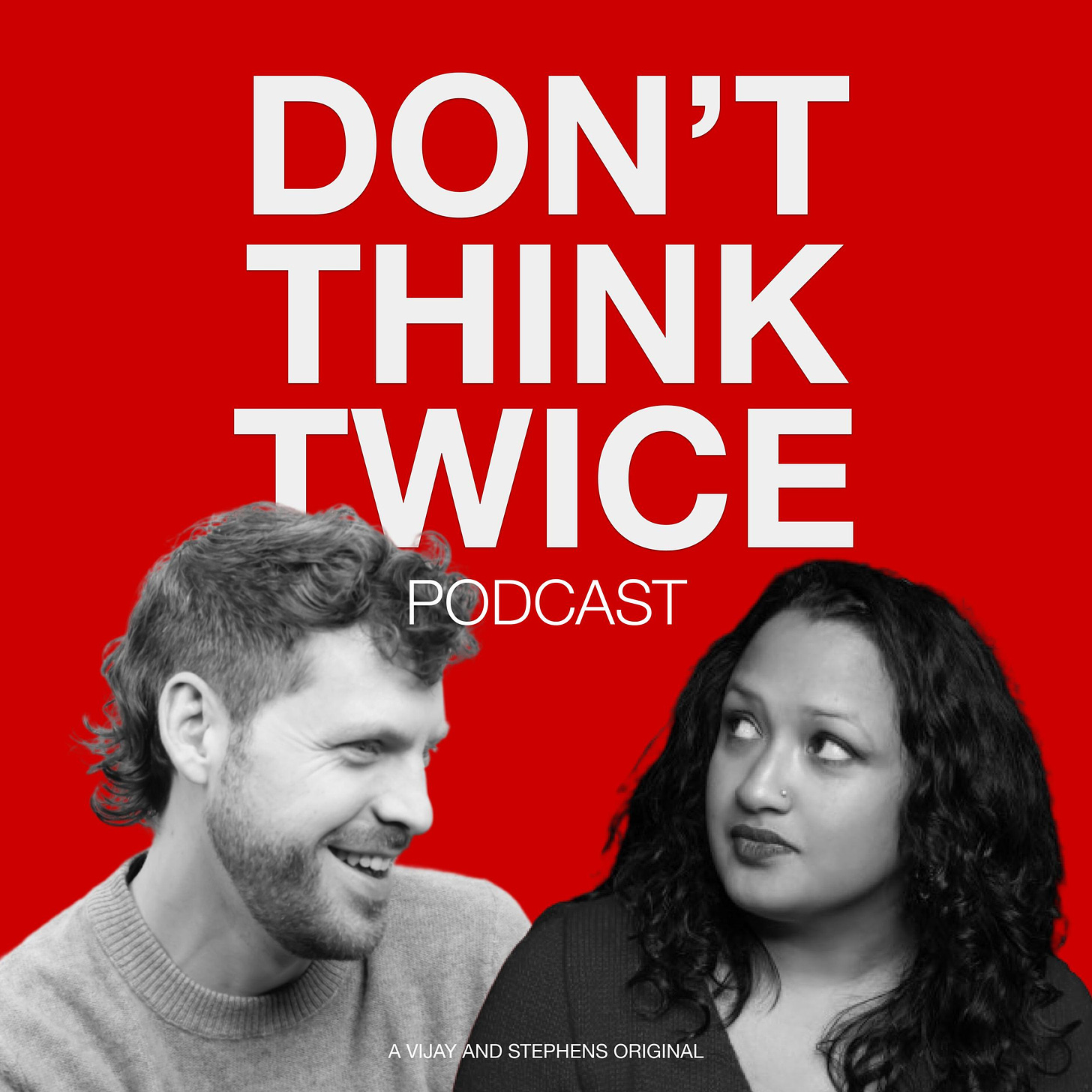Platonic Life Partners
How we think about our partnerships + Season 2 release of our podcast, Don't Think Twice
SEASON 2: Don’t Think Twice
It’s a big day! Here we are, nestled between our son’s first birthday (yesterday!) and International Day of Families (tomorrow). Which is to say, the stars must be aligned: Season 2 of Don’t Think Twice starts NOW.
On alternate Tuesdays, we’ll release a fresh slate of episodes that reflect on one year of co-parenting together. We will also look beyond ourselves, towards the joyful and sometimes-unconventional ways that people relate to one another in the modern world. Subscribe on Apple, Spotify, or wherever you listen to this sort of thing.
What is a PLATONIC LIFE PARTNER?
Today is a good day to confront a matter of semantics. Though it’s often preceded by a dismissive “just,” as in, “it’s just semantics,” terminology can be beneficial. It allows for efficient ground-laying. One might say ‘he is a single father,’ explaining both a romantic and parental status. A woman might introduce herself as ‘the CEO of a small startup’; we can imagine the frustrations of her day.
There is a term that we find ourselves using more and more these days: Platonic Life Partner. We use it to move conversations forward; to explain that our relationship is a deep friendship and maybe a bit more (but not like that!). It is a place where semantics fail, though, because there is no universal definition for this arrangement. As we mention in this week’s podcast episode, the term leans clinical; lacks warmth. But still – it remains meaningful and useful, despite its limitations.
For much of our relationship, the old classic descriptor of “friends” fit well — it’s a baggy word that describes relationships ranging from “work buddy” to “person you’d fly cross country for at the drop of a hat.” Then, there came a shift: we are still friends, AND we are something else. Something more…interdependent. We relied on each other more frequently for emotional support, not to mention the creative catharsis of our joint ventures. This shift remained easy to leave unspoken.1
But then, the baby: a tangible representation of our terminology problem.
The introduction of a child has made our relationship intriguing and perplexing to people who are curious to understand. At times, people seem to feel squeamish around our perceived boundary crossings. Teasing out our romantic lives separately from our family lives is transgressive and vaguely lurid; a gruesome dismantling of norms. The world is comfortable with deep, public romantic love. The world is less comfortable with deep, public friendship. It’s as though our society doesn’t know how to channel big, warm emotions into anything other than sex. We blame the perverted heart of modern religion, but that is an essay for another time.
The world is comfortable with deep, public romantic love. The world is less comfortable with deep, public friendship.
In the beginning, there were many caveats. “We’re friends, kinda. Friends, but with a baby. We aren’t together, but….” We weren’t wholly comfortable using Platonic Life Partner because, even to us, it felt both overly serious and very intimate. Sometimes a person would put the words together themselves like they were participating in an odd party game. “So, you’re, like, platonic friends, but also, like partners in everything?” We’d hem and haw, clarify and confuse, add additional information that only served to reinforce their diagnosis. Finally, our energy for stepping around the term was worn down and we submitted to the semantic convenience of it all. It’s not perfect, but most terms aren’t.
Platonic life partner telegraphs commitment. We are committed to living in proximity, we are committed to sharing finances and children.2 It is a neat term to latch onto for strangers, family acquaintances, in business settings, and for potential romantic partners.
At moments, though, it can feel like a cudgel, walloping someone with an amorphous blob of meaning that feels more political or radical than we intend. We are not advocating for a new paradigm as much as we are grasping for language that sheds some understanding onto our own lives and relationship. New language can feel unnerving to some; as if they have been left on the side of the road in a vernacular vehicle with two flat tires and a busted radiator. These infernal kids with their new-fangled words! [waves angry fist in air]. But trying to communicate is better than not trying to communicate and so we respectfully unnerve the nerved.
Even so, what others call us is not our business. They may use different words to describe our relationship. Others may feel no need to explain. Still others choose to lie in mixed company, saving feelings and choosing battles. These all have a place and we don’t seek to police others’ language. We know who and what we are. To put it simply, when it comes to the semantics of our Platonic Life Partnership, it’s like the 80s country music superstar Kenny Loggins often remarked, “that’s an old saying I just made up.”
Pre-Aadi, I briefly tried on “best friend” for size, and will never forget the withering remark made by a new acquaintance at a house party: “‘best friends’? What are you, twelve?” Platonic Life Partner amplifies the gravity, but who knows if it would have spared us from this particular critic’s wit.
Friends have always done these things, of course. Reaching back before the idea of the nuclear family —and its domination over popular understandings of the traditional family structure— we find many communal structures that could be described as platonic life partnerships.







